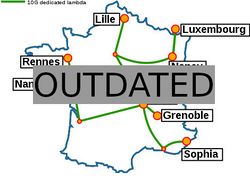Grid5000:Home
|
Grid'5000 is a large-scale and versatile testbed for experiment-driven research in all areas of computer science, with a focus on parallel and distributed computing including Cloud, HPC and Big Data. Key features:
Older documents:
|
Random pick of publications
Five random publications that benefited from Grid'5000 (at least 2937 overall):
- Louis Roussel. Integral Equations Modelling and Deep Learning. Computer Science cs. Université de Lille, 2025. English. NNT : . tel-05425240 view on HAL pdf
- Sweta Suresh, Maxime Guillaud. Belief Propagation Decoding of Tensor-Based Modulation for Unsourced Random Access. IZS 2026 - International Zurich Seminar on Information and Communication, Feb 2026, Zurich, Switzerland. hal-05451488 view on HAL pdf
- Danilo Carastan-Santos, Georges da Costa, Millian Poquet, Patricia Stolf, Denis Trystram. Light-weight prediction for improving energy consumption in HPC platforms. Euro-Par 2024, Carretero, J., Shende, S., Garcia-Blas, J., Brandic, I., Olcoz, K., Schreiber, M., Aug 2024, Madrid, Spain. pp.152-165, 10.1007/978-3-031-69577-3_11. hal-04566184v2 view on HAL pdf
- Sofía Callejas, Hernan Lira, Andrew Berry, Luis Martí, Nayat Sanchez-Pi. No Plankton Left Behind: Preliminary results on massive plankton image recognition. 1th Latin American High Performance Computing Conference - CARLA 2024, Ginés Guerrero; Jaime San Martín; Esteban Meneses; Carlos J Barrios H; Carla Osthoff; Jose M Monsalve Diaz, Sep 2024, Santiago de Chile, Chile. hal-04803602 view on HAL pdf
- Hugo Thomas, Guillaume Gravier, Pascale Sébillot. One-shot relation retrieval in news archives: adapting N-way K-shot relation classification for efficient knowledge extraction. KES 2024 - 28th International Conference on Knowledge-Based and Intelligent Information & Engineering Systems, Sep 2024, Seville, Spain. pp.1060-1069. hal-04708239 view on HAL pdf
Latest news
Failed to load RSS feed from https://www.grid5000.fr/mediawiki/index.php?title=News&action=feed&feed=atom: Error parsing XML for RSS
Grid'5000 sites
Current funding
As from June 2008, Inria is the main contributor to Grid'5000 funding.
INRIA |
CNRS |
UniversitiesUniversité Grenoble Alpes, Grenoble INP |
Regional councilsAquitaine |


